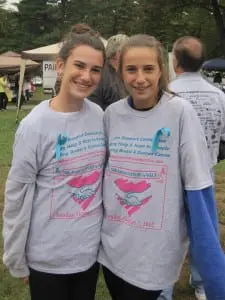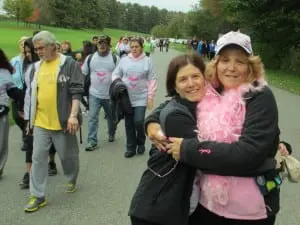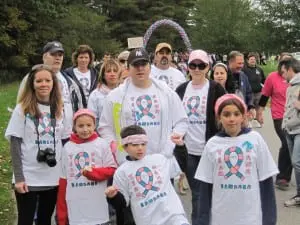Cancer survivors maintain circle of sustenance
By Alison Rooney
The shock of a cancer diagnosis creates more than just a need for medical attention. Along with emotional needs there are logistical ones; for every question about side effects there is also help needed in navigating the shift in family dynamics. Support Connection (SC), the most extensive breast and ovarian cancer support group in this region, is there to counsel women in any and all of these areas on a ‘no question is too small, no amount of times is too many’ basis.

Staffed by peer counselors, all of whom are cancer survivors themselves, Support Connection also relies on a large number of volunteers, ready to reach out in many different ways, including through in-person and telephone support groups, wellness classes, educational forums and workshops and much more. This support is open not only to women who have been diagnosed, but to their families and friends as well.
Located in Yorktown Heights, Support Connection works with women throughout the country, via a nation-wide toll-free cancer and support helpline. They have helped many women in Putnam County in person, and over the phone, or at one of the many support groups which take place in Putnam, Dutchess and Westchester. Established in 1986, this 501(c)(3) nonprofit’s mission is to “provide emotional, social and educational support services to women, their families and friends affected by breast and ovarian cancer. The support enables women to help each other and empowers them to become their own health care advocates.
It all begins with a simple phone call or walk through the door. “When you call, you speak to a person right away,” says Barbara Cervoni, SC’s director of services and communications, “you’re connected directly to a peer counselor — there is no screening process. There are three staff peer counselors; each has a different background and experience and is a breast or ovarian cancer survivor herself. There is an internal training process so that consistency is maintained. We are here to help sort things through. Sometimes it’s not just during diagnosis; there are always needs, and needs evolve. We help sort through and validate what their experience is, so that it’s not ‘in their head’ — it’s about cutting out some of the noise, from the perspective of those who have been there, too.”
Cervoni adds that because the three counselors talk to virtually everyone, the counselors have the experiences of hundreds of other women to reference. “It’s very validating,” she says, “Because the counselors have no stake in it, there is no judging. Many women don’t want to burden family members, but want to talk about it to someone.” Volunteers are brought in to match up with certain needs, for instance Spanish speaking, or someone whose treatment caused the same side effect.

The questions and concerns can range from things as straightforward as where to buy a wig to “Have you heard of this treatment?” or “How do I talk to my kids?” There is also a wealth of information to share, including transportation resources and other fundamentals. SC maintains a lending library and online links available to all. Cervoni says that SC’s one-to-one, toll-free, survivor-to-survivor contact doesn’t really happen anywhere else, and it has led them to develop resources and expand their knowledge in other states to respond to the need.
The online support group developed largely in response to the very limited information sources devoted to women with ovarian cancer. As opposed to the many groups relating to breast cancer, ovarian is less commonly diagnosed, and often women with this cancer feel very isolated, lacking both a peer group and easy access to the latest information. Each September SC facilitates an educational teleconference dedicated to a particular ovarian cancer issue.
Locally SC currently runs 12 different support groups, some facilitated by peer counselors, others by volunteers, all of whom, once again, are survivors with a previous connection to SC. All the volunteers receive training. Four breast cancer groups meet once a month, on different days of the week at locations including Cortlandt Manor, Carmel, Yorktown Heights and Chappaqua; four breast and ovarian groups meet on a similar schedule in Yorktown Heights, Carmel and Hopewell Junction; groups are also dedicated to young women with breast cancer and women with advanced stage cancer. Support Connection’s website has the full details on all of these meetings, and information can usually be found on Philipstown.info’s online calendar as well.

SC also hosts very popular wellness classes. A yoga class solely for women with breast or ovarian cancer has been held at Club Fit in Yorktown for years. There, says Cervoni, “women can focus on themselves and take control of what’s happening to them by doing healthful activities.” There’s also a knitting circle and there have been clay workshops, as well as meditation and Reiki sessions, all “soothing activities which give women an opportunity to be with other people going through the same thing without it being an out-and-out support group,” Cervoni explains. SC does a lot of evaluation as to what their clients need. There are annual surveys and workshop evaluation forms to best assess what people are benefiting from, and to formulate a year’s plan.
SC is funded largely through grants (both private and some from New York State,) private donations and fundraising. Cervoni notes that most grant funding is funneled to cancer research and screening and not to support organizations. They receive little to no funding from the large national cancer organizations. One of SC’s biggest challenges, according to Cervoni, is that “because we do things so well and make it appear so easy, people don’t realize how little funding we have, and don’t realize we need their help.”

SC’s biggest fundraiser is their annual October Support-A-Walk event, this year taking place Oct. 6, rain or shine, at FDR State Park in Yorktown Heights off Route 202. Last year this three-mile event attracted more than 9,000 participants, and Cervoni calls it not only a fundraiser, but “a chance to show what we do. People come from all over, in groups, families, year after year, often in memory of someone they have lost. It’s a day to celebrate and remember.”
To learn how you can become a Walk participant, sponsor, fundraiser or volunteer, contact SC at 914-962-6402 or e-mail them at [email protected]. Volunteers are also needed and welcomed for various duties, from office help to event staffing. From 4 to 8 p.m. on Tuesday, Sept. 10, Support Connection will host an open house at their office, where you can meet their staff and volunteers, enjoy light refreshments and take advantage of hands-on help in helping to form a team, set up an online fundraising page, register or donate. You can also pick up Walk brochures, flyers and T-shirts.
To learn more about Support Connection’s programs and services, or to lend your support by donating or volunteering, visit supportconnection.org, email [email protected], or call 914-962-6402. Support Connection’s toll-free cancer information and support hotline is 800-532-4290. All services are free and unlimited, and if you’re in need of help, just give them a call, send an email, or visit them at 40 Triangle Center, Suite 100, Yorktown Heights.
Photos courtesy Support Connection

